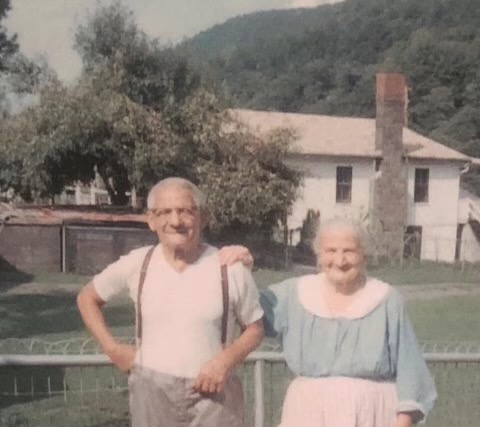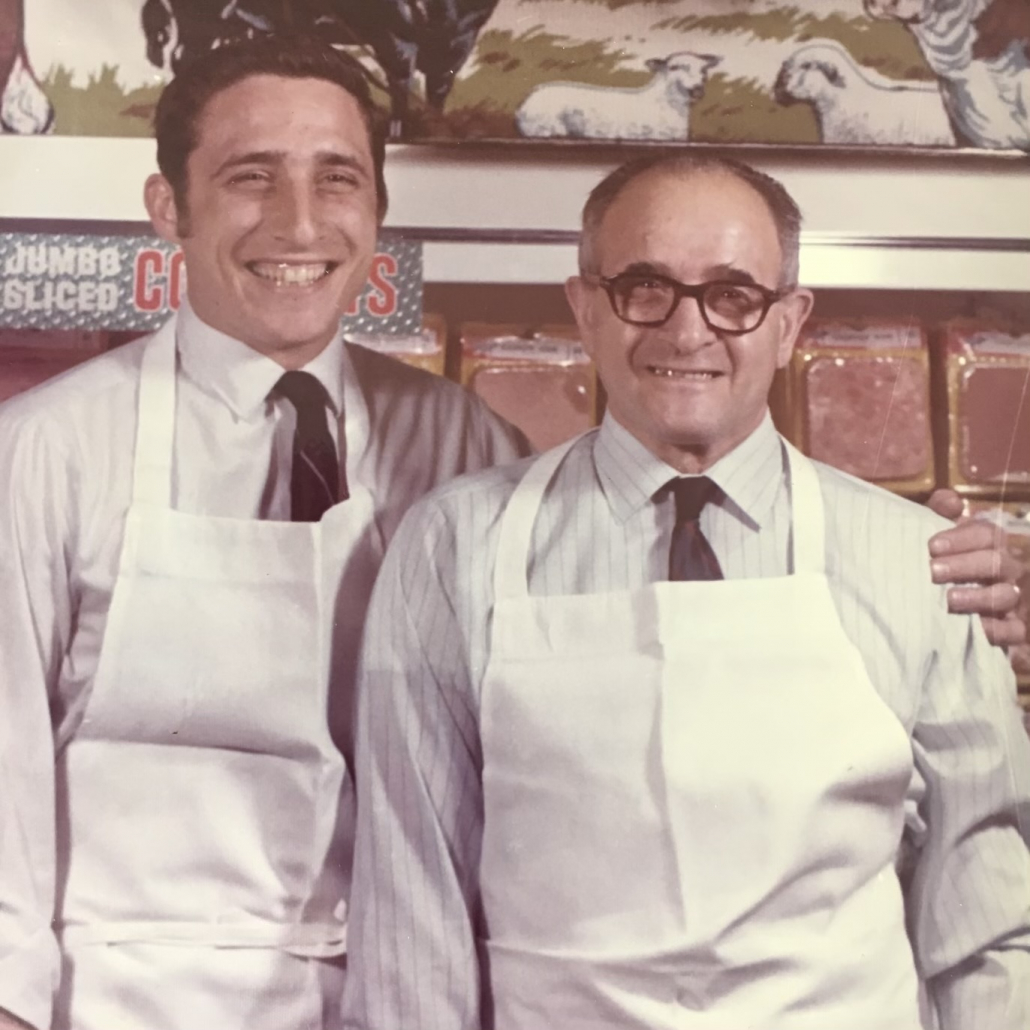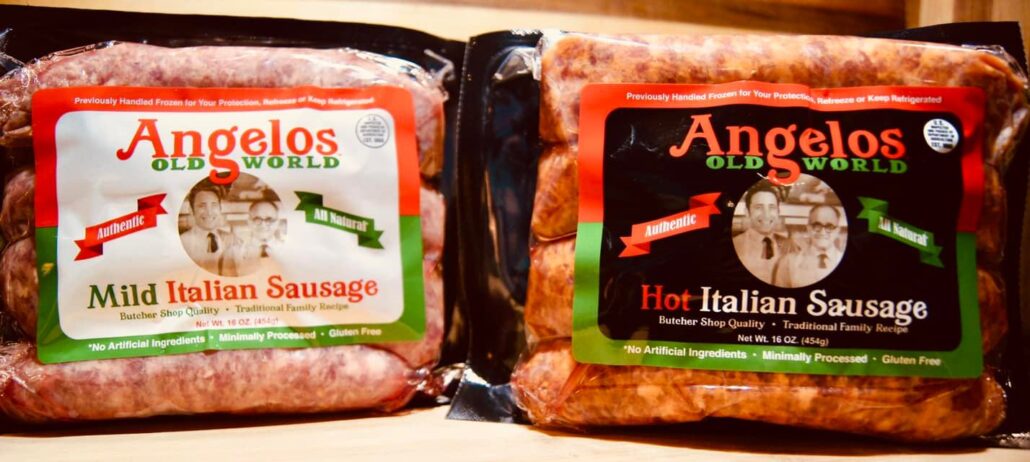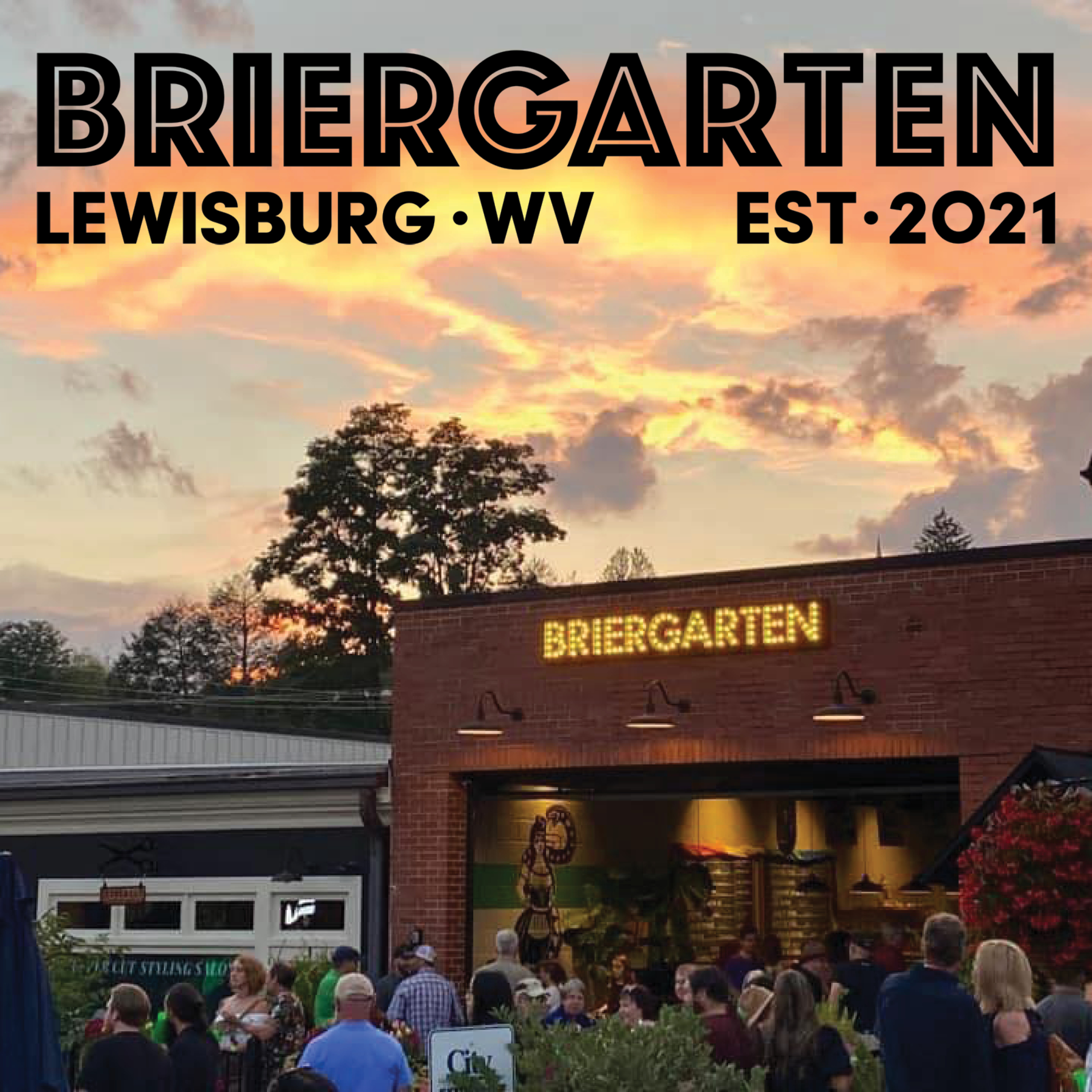“So, tell me about your product,” said the man sitting behind the desk in the tiny office. “Why should we stock your sausage?”
Sonny looked to his left, the soft white of the fluorescent lights overhead glinting off his glasses. He knew his son would begin their story – one that traces back over a century and across an ocean.
“Our product is truly authentic,” said Louie in his soft but confident voice. “Our sausage is not complicated; it’s very much like my great-grandfather learned to make it in the Old World. For us, it’s not so much about what we put in it…it’s what we don’t.”
“So, this is an old family recipe, then?” asked the man behind the desk, with only a slight amount of curiosity detectable in his voice.
“My father’s side of the family — the Argentos — immigrated from Sicily. My mother’s side — the Lopez family — came from Calabria in south central Italy, an area much like West Virginia in terms of mountains and rugged beauty,” answered Sonny. “That’s really where our recipe traces back to…”
Life in Sicily during the early 1900s was hard, especially working as a sharecropper in a vineyard. There were rumors, though, of a place where opportunity was almost limitless for you and your family if you were willing to work for it.
Liborio Argento’s journey from Sicily to the mountains of West Virginia was long but filled with hope – for himself and his wife and children that he left behind. When he arrived at Ellis Island in New York Harbor, hope was really about all he had, but he was determined to find his place in America.
That place would be Fayette County, West Virginia, where he found work in the coal mines. The work was tough, backbreaking, and largely unrewarding – much like what he left behind in Sicily and bordering on indentured servitude.
But he was in America – and that meant hope.
Liborio labored and saved and hoped until he was able to save up enough money to send for his wife and children to make the journey from Sicily to join him in the heart of the Appalachian Mountains, where they would build a life for themselves and their family.
“Every fall, my grandfather would kill a hog and they’d make sausage,” Sonny said. “He did it the way that he had learned back in Calabria. It was a pretty primitive process, back before electricity so there weren’t any tools like electric grinders or anything like that.”
The man sitting behind the desk remained silent, but the expression on his face had started to change as his attention focused on the story.
“All the kids would help mince up the meat as fine as they could with knives, and my grandmother would clean out the membranes for casings,” continued Sonny.
“A natural casing is actually the membrane from the hog’s intestine,” said Louie, interrupting in case the man behind the desk was like most people – unaware of how it was done for centuries before in the Old World.
“Yes…,” agreed Sonny before continuing. “So, my grandfather would stretch the casing over the end of an old hollowed out cow horn and then stuff the chopped-up meat — that they had seasoned with salt and fennel and some other spices — into the casing by hand. They would take the coils and put them down into a stone crock and render the lard down over that and seal it, which preserved it.”
“Wow, that’s pretty fascinating,” said the man behind the desk, joining in the conversation for the first time. “I had no idea that’s how they did it…never really thought about it, I guess.”
“So, that’s actually something unique about our sausage that’s inspired by how they had to do it in the Old World,” said Louie. “Our sausage is minimally processed and still made in small batches. It gives you a nice, meaty bite…kinda like how it would have been with those hand chopped and hand stuffed traditional sausages.”
“Well, that’s how my mom – her name was Serafina Lopez — learned to do it as a child helping my grandfather,” said Sonny. “Eventually, it was what she and Dad sold in Angelo’s Market…”
There was only so much he could take.
Angelo Argento had been working in the coal mines, like his father Liborio, since he was thirteen. It was hard and often unrewarding labor. Men were paid by the ton of coal they dug…not by the hour, and many times, it took the bigger part of a day just to dig through rock to reach the resource that would bring them their pay. For immigrants and minorities, their path was often even more difficult, as bosses often placed their buddies in the places where the coal was easiest to reach and recover.
After thirteen years of working in the mines – at only age twenty-six – Angelo Argento had had enough.
It was a decision that ultimately led him to his life’s calling – opening A. Argento & Company General Merchandise, which eventually came to be known as Angelo’s Market, in the middle of the Great Depression. The small frame structure that he built himself next to the railroad tracks in Powellton, West Virginia was part general store, part supermarket, and part local gathering place – especially for the many Italians that lived in the area.
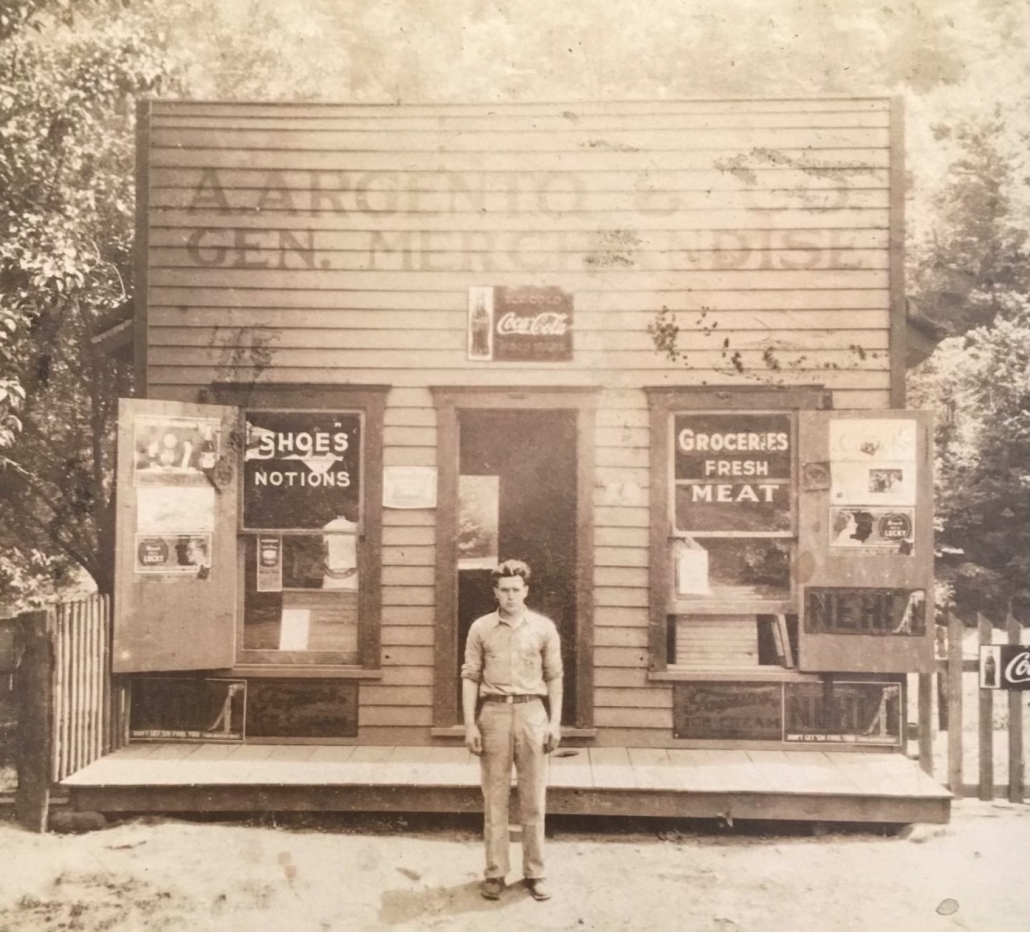
Angelo Argento in front of A. Argento & Company General Merchandise store in Powellton, West Virginia circa 1937.
Many of the younger local Italians from Boomer or Powellton, small towns on opposite sides of the Kanawha river where many of the coal miners lived, met their future spouses at the market. It was also the place that led to Angelo meeting his future wife Sarah – Serafina Lopez.
The man behind the desk leaned forward in his chair slightly and picked up the Styrofoam cup with faint vapors of steam rising above its rim. “So, your family was in the grocery business?” he asked, a common bond becoming obvious.
“Yes, my grandparents owned Angelo’s Market in Powellton,” answered Louie. “They made sausage there in the store based on the recipe that she learned from her dad.”
“They would grind the pork there on a butcher block in the meat shop,” said Sonny, his voice drifting back in a way that you could tell he was picturing that scene from his childhood in his mind’s eye. “Mom would add the spices – fennel and salt et cetera – and then they’d run it through this hand crank tool to stuff the meat into the casings.”
Jumping in with his own nostalgic memories, Louie remembered moments like this, “Ninny would dip her finger in the meat before they’d stuff the casings to check the flavor. Remember, this is raw pork…and she would say things like ‘needs more salt’ or ‘needs more fennel’.”
The man behind the desk took one last sip of his coffee and smiled.
“I grew up working in a little local market like that. First job I ever had,” he said. “Those were simpler times, for sure. Probably better times in some ways.”
“Oh, absolutely,” said Louie. “Some of my best memories as a kid back in the seventies and eighties are connected to that store…”
Sundays were special.
Every week after church, the whole family would gather at the house Angelo built in Powellton. Angelo and Sarah and their children and grandchildren would share a tradition so common among large Italian families – the Sunday dinner.
Spaghetti…lasagna…rigatoni…and, of course, the family recipe sausage.
Coming from a family that had five children, Louis had plenty of cousins to play with on these Sunday afternoons, and each one of them waited anxiously for the time in the afternoon when the adults would settle in to rest and chat. They all knew that Ninny would be along soon to sneak them to the Market which sat in front of the house.
Angelo’s Market was closed on Sundays…except for Sarah’s grandchildren. Each one there would get a small, brown paper bag that they could fill with whatever they wanted from the store. Invariably, that was candy.
And PawPaw never knew…at least he acted like he didn’t.
“My grandparent’s sausage was very popular,” said Louie. “Almost all the families there in Powellton and many in the surrounding area would come in to buy it, of course. But they had customers and restaurant owners that would come from Kanawha City and Beckley and Charleston to the Market – just to buy their sausage.”
The man behind the desk smiled and nodded, as if the story had somehow transported him back to the small, country store.
“It became a big tradition around Christmas-time,” picked up Sonny. “It was almost a staple for a lot of families that time of year – especially in the Italian community.”
It was odd that the question hadn’t come to him before, but the man behind the chair suddenly sat up a little higher. “Is the Market not there anymore, then?”
“No,” replied Sonny. “It stayed open until 2008. By that time, a lot of the mining jobs in that area had gone away, as did the people. It just didn’t make sense to keep it open.”
“So, after Angelo’s Market closed, we would get requests from family or from people who had been customers for years to make them some sausage,” said Louie. “We did that when we could – just for friends and family…”
The man behind the desk interrupted.
“So, when did you start packaging and selling it then?”
“Well, it was something that Dad and I had talked about for years, really,” said Louie. “I was actually working in commercial banking – and doing well – but I got to a point that I had had enough. I guess in ways like PawPaw was with the mines.”
Louis paused for a couple of moments. The only sound in the tiny office was the faint hum of the fluorescent lights overhead.
“I talked to Dad about wanting to create a brand based on our family’s sausage…and our family’s heritage,” Louie continued. “We worked out a deal with the Piggly Wiggly in Kanawha City to make and sell Angelo’s Old World Sausage out of their store. That was in…2016.”
“Word got out, and it just kind of took off,” said Louie. “People just loved that sausage they remembered from Angelo’s Market.”
A smile spread across Sonny’s face…one of pride and happiness and fulfillment. The man behind the desk recognized immediately that it was the look of someone who knew his family’s legacy and heritage and traditions would be carried on.
“Our recipe replicates that traditional way of doing things. Everything is natural…no preservatives, no colorings, no fillers,” explained Louis, with a noticeable sense of pride in his voice. “Look at a package of the big ‘national’ brands of sausage. Usually, the second or third ingredient you see on the label is corn syrup. Corn syrup! They definitely weren’t adding corn syrup to their sausage back in the Old World.”
The man behind the desk chuckled, “No, I wouldn’t think so.”
“We have gone from selling out of that one Piggly Wiggly to stores all around West Virginia,” said Louie. “And a lot of restaurants, also.”
“Oh, what restaurants do you sell to?” asked the man in the chair.
“Several restaurants and chefs in the Charleston area use our sausage,” answered Louie. “Chef Paul…Paul Smith…uses our sausage at 1010 Bridge and The Pitch… Lola’s Pizza in South Hills… Soho’s…just to name a few. There are several. More all the time.”
The man behind the chair nodded and smiled, his thoughtfulness fully on display from the look on his face. Louie reached down to his left side and picked up a small, red and white cooler. Opening the top, he reached in and pulled out a pack of four sausages and handed them across the desk.
The man behind the desk looked at the red and green label with a small photo in the center. The black and white image told a story over a century in the making — two men in ties and butcher’s aprons smiling at the camera. Having heard the story, the man in the chair immediately knew it to be Sonny Argento and his father Angelo.
“You know, I think we can give it a try,” said the man behind the chair after a short, silent pause. “People like knowing the story behind the product…and that it’s authentic. You’ve convinced me, that’s for sure.”
Louie and Sonny stood up at nearly the same time and both reached across the cluttered desk to shake hands.
“Give me a call next week, and we’ll work out the details,” said the man behind the desk. “In the meantime…if you don’t mind…I’m going to take this home tonight and make dinner for the wife for a change.”
Louie chuckled, “She won’t be disappointed, I’m sure.”
He reached across the dining room table and carefully poured her a second glass of Chianti. A contented smile spread across her face.
“Thank you, Babe,” she said. “It’s been a while since you cooked…you know it’s not our anniversary, right?” Her playful laugh made it obvious that she was only kidding.
“Yeah, it has,” he said. “So, what did you think?”
“I mean…you know I’m a sucker for good Italian…,” she answered before taking a sip of the deep purple wine. “But this was absolutely amazing. What inspired you…?”
The man across the dining room table smiled thoughtfully, swirling the wine in his glass and watching its liquid legs slowly run down the curved glass.
“Just a story I heard today,” he finally answered.
“Well, that must have been SOME story,” she said, still smiling and looking at him somewhat playfully.
“It was. It really, really was.”
You can find Angelo’s Old World Sausage at grocery stores and markets around the state of West Virginia, including various Kroger, Piggly Wiggly, Food Fair, and Grants stores as well as specialty meat butcher shops. You can also buy their products online at their website — angelosoldworld.com .

